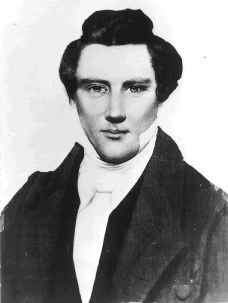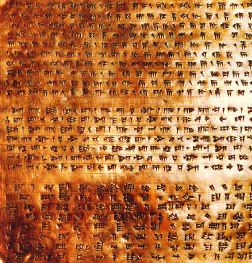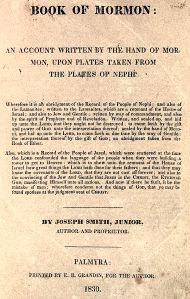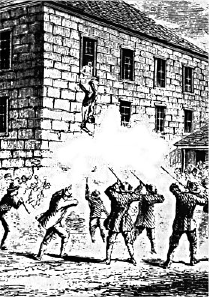|
Joseph Smith There's two ways to look at Joseph Smith, founder of the Mormon Church. On the one hand you can view him as a fraud -- a monomaniacal polygamist, an opportunist who shamelessly exploited his religious followers, who was murdered by an angry mob, infuriated by all his bullshit. On the other hand, you could be a Mormon. In which case, he's the greatest man who ever lived. Your call.
There's two ways to look at Joseph Smith, founder of the Mormon Church. On the one hand you can view him as a fraud -- a monomaniacal polygamist, an opportunist who shamelessly exploited his religious followers, who was murdered by an angry mob, infuriated by all his bullshit. On the other hand, you could be a Mormon. In which case, he's the greatest man who ever lived. Your call.
One morning in 1820, fourteen-year-old Joseph Smith, Jr. had a problem: he needed to know which religion was right. So he went into the woods and prayed for guidance. Then Jesus and His Dad appeared and gave Smith some unbelievable news:
Smith told no one about the vision, and nothing happened for three years. Then he received another visitation, this time from an angel named Moroni. Sort of like the holographic schematics of the Death Star shown to the Rebel pilots during their briefing, Moroni showed Smith a cavity hidden inside a mountain, conveniently located just outside his hometown. (What a coincidence.) In the cave was a room with wooden furnishings, with a bunch of gold tablets stacked up on the table. Then the angel told him not to go near the site until he received specific orders to do so. So Smith never told anybody about that vision either.
The resulting divine scripture was the account of the lost tribe of Israel, which had sailed from Canaan across the seas to North America around 2250 B.C. They were met by an exotic land, full of elephants and horses and other things that don't make any sense. Anyway, these transplanted Hebrews established a vast civilization and were even visited by Jesus, who established a ministry there. This work, a 275,000-word tome entitled The Book of Mormon, provided the foundation for the LDS faith. After the book was translated, the angel came and repossessed the gold plates, which is why they haven't been exhibited in a museum someplace. The church grew rapidly. And why not? It contained the perfect American theology. For one thing, it proved that the doctrine of Manifest Destiny was divinely-inspired. America was the chosen land. And, of course, it was represented as the church to supplant all others, the One True Faith. So it was the new and improved Christian religion.
BY JOSEPH SMITH, JUNIOR,
Of course, he wasn't just the day manager. Smith adopted the official title of Prophet, Seer, and Revelator, claiming he literally spoke for God. Just like the Pope, except he was a U.S. citizen. According to the church, God even endorsed the cornerstone of American society, despite its controversial status around the world. That being the centuries-old institution of involuntary servitude. As Joseph Smith, God's mouthpiece, wrote in April 1836:
The fact is inconvertible, that the first mention we have of slavery, is found in the Holy Bible, pronounced by a man who was perfect in his generation, and walked with God. As prophet, Smith yielded an incessant stream of revelations and divine judgments. God told the Mormons that a man could enter Heaven only by way of plural marriage (aka polygamy). Smith himself had at least 28 wives. But the government hounded them over this, and they were forced to deny it. God also told them to pool all their money and form a Mormon bank. It failed shortly thereafter. Years after William Miller started predicting that Jesus would be back Real Soon Now, Smith revealed a similar prophecy in February 1835. Except that Smith's was not exactly what you would call specific. When Joseph nagged God about the timing of Christ's return, the Creator answered with clear annoyance:
I was once praying very earnestly to know the time of the coming of the Son of Man, when I heard a voice repeat the following: Surprisingly, God appeared to be uncertain whether Joseph would live to be 85. You would think that if anyone could predict when somebody is going to die, it would be the Almighty. Of course, in the end God was correct to hedge His bet.
"I am going like a lamb to the slaughter; but I am calm as a summer's morning; I have a conscience void of offense towards God, and towards all men. I shall die innocent, and it shall be said of me -- he was murdered in cold blood." Or at least, that's what the Mormons say. It seems pretty damn unlikely, when you consider Smith's long track record of interstate flight from prosecution (not to mention evading his creditors). And besides, if he was genuinely acquiescing to his impending martyrdom, then why did he bring the gun? When the angry mob showed up, the lamb whipped out a pistol and shot three guys, killing two of them. But the crowd was too big and he ran out of bullets. Smith ran to the second-story window and looked out -- more armed vigilantes were outside. Smith climbed out on the windowsill. He may or may not have given a Masonic distress signal: "Is there no help for the widow's son?" Evidently not. Then Smith either jumped or fell, breaking his shoulder. One of the mob stabbed him several times with a bayonet, then dragged Smith against a well. That's when the mob shot him to pieces. After Smith's death, the Mormons split in half. His wife and son created the Reorganized LDS church (RLDS), and Brigham Young led the remnants of the original group westward to the Utah Territory. Young blamed the Masons for Smith's murder, and forbade any Mormons from joining the Freemasons. The Masons reciprocated in kind.
timeline
|
 Another four years passed, and then he finally got the go-ahead to grab the gold tablets. He also picked up two magical rocks which were made famous in the Old Testament: the Urim and Thummim. With those stones -- and a lucky brown rock he found at the bottom of a well -- he set out to transcribe the mysterious markings on the plates.
Another four years passed, and then he finally got the go-ahead to grab the gold tablets. He also picked up two magical rocks which were made famous in the Old Testament: the Urim and Thummim. With those stones -- and a lucky brown rock he found at the bottom of a well -- he set out to transcribe the mysterious markings on the plates.
 Best of all, its prophet was a U.S. citizen, embodying the entrepreneurial spirit that made this country great. He wasn't content to be the Prometheus who brought the world the one true way. He had to claim credit and ownership. The first edition of The Book of Mormon bore the following on its title page:
Best of all, its prophet was a U.S. citizen, embodying the entrepreneurial spirit that made this country great. He wasn't content to be the Prometheus who brought the world the one true way. He had to claim credit and ownership. The first edition of The Book of Mormon bore the following on its title page:
 It all ended nine years later in an Illinois jail. Before he surrendered to custody in June 1844, Smith made a little speech to his Mormon brethren:
It all ended nine years later in an Illinois jail. Before he surrendered to custody in June 1844, Smith made a little speech to his Mormon brethren: